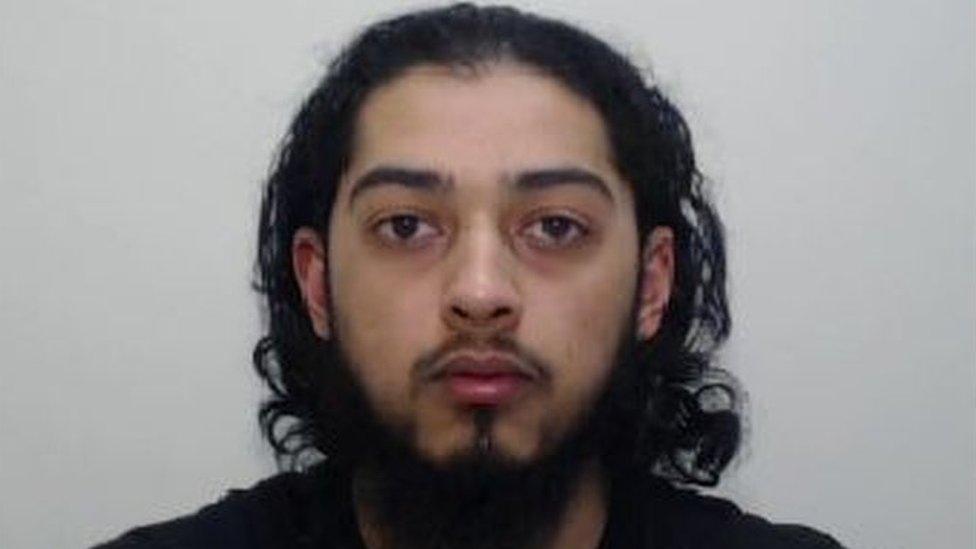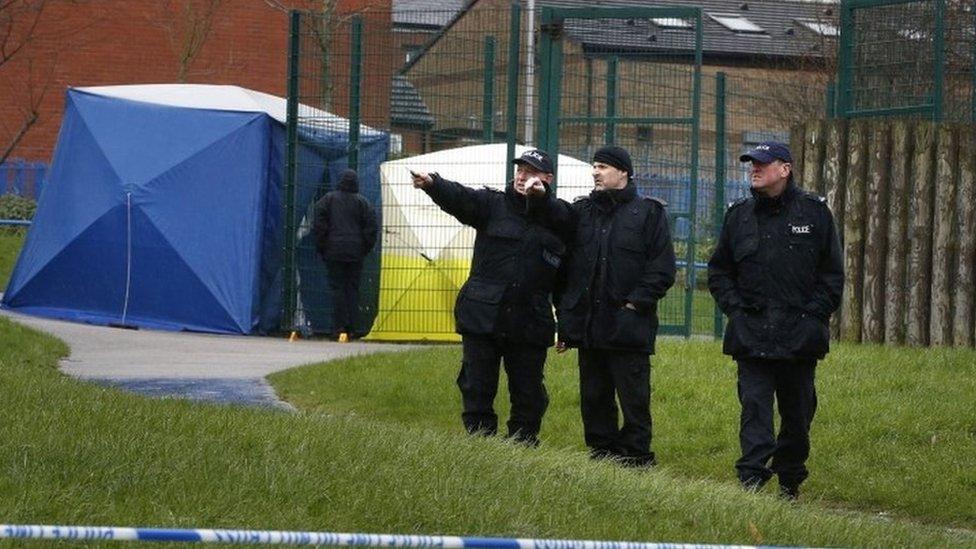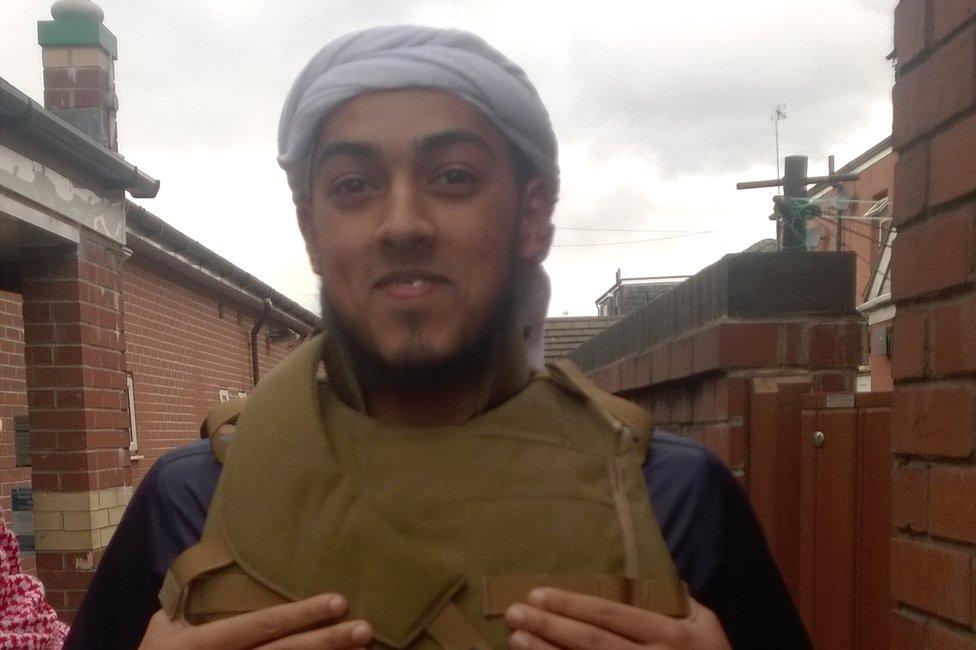Jalal Uddin murder: Syeedy guilty over Rochdale imam death
- Published

Mohammed Hussain Syeedy targeted the imam because of his spiritual healing practices
A man has been found guilty of murdering an imam he believed was performing "black magic".
Jalal Uddin was bludgeoned in the face in an attack in a Rochdale children's play area in February.
Mohammed Hussain Syeedy, 21, from the town, drove the man said to have killed the 71-year-old - Mohammed Kadir - to the park before the attack.
Manchester Crown Court heard he hated the imam's practices. He was jailed for life with a minimum term of 24 years.
High Court judge Sir David Maddison said Mr Uddin was a "gentle, well-respected man" who was "brutally" killed because he practised taweez faith healing.
Why was this imam targeted?
He told Syeedy: "You and your co-offender saw the practice as a form of black magic that could not be tolerated within Islam.
"You stalked him" and "the intention was to cause extreme, grave and permanently disabling harm", the judge added.
Murder of an imam - the interpretation of 'magic'
Syeedy shook his head several times when the jury returned its verdict after four hours of deliberations. His alleged accomplice Mr Kadir, of Chamber Road, Oldham, has left the UK and is thought to be in Syria.
The court heard Syeedy and Mr Kadir were consumed by hatred of Mr Uddin because he practised a form of Islamic healing in Rochdale's Bangladeshi community which the so-called Islamic State (IS) considers "black magic".

Analysis: Dominic Casciani, Home Affairs correspondent
Everyone I spoke to in Rochdale says Jalal Uddin was a kind man who lived a simple life, providing religious education to the young and spiritual support to the sick, elderly and grieving.
But for Syeedy and his partner, who's now probably in Syria, the imam wasn't Muslim enough.
Why? Because they adhered to a violent with-us-or-against-us ideology whose followers, be they so-called Islamic State, al-Qaeda or another jihadist outfit, believe they have the right to be the judge, jury and execution of others.
If you don't agree with them, you've abandoned the faith. And if you've abandoned the faith, the penalty is death.
This may read like a horrible isolated crime, but it's not. In fact it's the second murder in a year of a Muslim by another Muslim for purely sectarian reasons.
Glasgow shopkeeper Assad Shah was killed in different circumstances - but his killer's motivation was the same.

Spiritual healer Mr Uddin was targeted after it was discovered he was providing taweez, in which he made amulets to bring good fortune to the wearer.
Some consider the practice of taweez as positive but IS, which Syeedy and Mr Kadir were said in court to support, regards all "magic" as forbidden and believes those who practise it should be punished, often by death.
Former Manchester United steward Syeedy was involved in surveillance of the spiritual healer and, along with Mr Kadir, followed him after he left the Jalalia Mosque to go to a friend's house for an evening meal on 18 February.
The court heard he did not agree with taweez and planned get Mr Uddin deported - he had overstayed illegally after moving to the UK to work as an imam in 2002.
When that failed, the pair wanted to expose Mr Uddin's practices and Mr Kadir entered the park in a bid to dupe him into giving a taweez, which could then be presented to the mosque committee.
The court heard Syeedy was a "knowing participant" in the murder and his claim he had no idea what Mr Kadir planned and then carried out was "absurd".

Mr Uddin was attacked in a play area in Rochdale
Mr Uddin was dealt at least five blows when he was bludgeoned in the face with what is believed to have been a hammer in the park. He later died in hospital.
The ferocity of the attack meant his skull was driven down into his brain and his dentures were broken.
The jury heard that Syeedy may have provided the murder weapon, which has not been found.
When police searched the former engineering student's home after his arrest, officers found a "large volume" of IS-related material on his phone and other devices which showed he had been radicalised, the jury was told.
Giving evidence, the Rochdale-born Muslim said he was not a follower of IS and was "disgusted" about the death of Mr Uddin.

Mohammed Hussain Syeedy was pictured wearing a stab-proof vest ahead of a Syrian aid convoy in 2013
Det Ch Supt Tony Mole said: "Although Mohammed Syeedy may not have delivered the fatal blow to Mr Uddin, it is clear that he played an integral role in the murder."
In a tribute, Mr Uddin's family said it was an "incredibly cruel and callous attack" on an "innocent elderly man" by "deplorable and cowardly" killers.
"Although Jalal was a Muslim who peacefully practised his faith, he had a love and respect for all religions, cultures and creeds, and the fact that he was murdered by someone inspired by Isil [IS] shows the true nature and barbarity of this organisation and those who serve it.
"Weeks prior to his murder, Jalal had intended to return to Bangladesh and be reunited with his wife, children and grandchildren.
"We take comfort from the fact that the evidence acknowledges that Jalal was a greatly respected man, a caring and loving soul... Jalal was the greatest man in our lives; his smile will never be replaced."